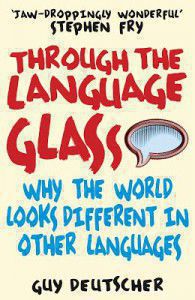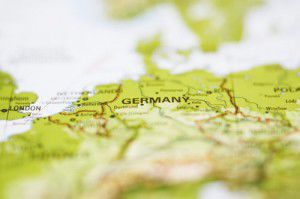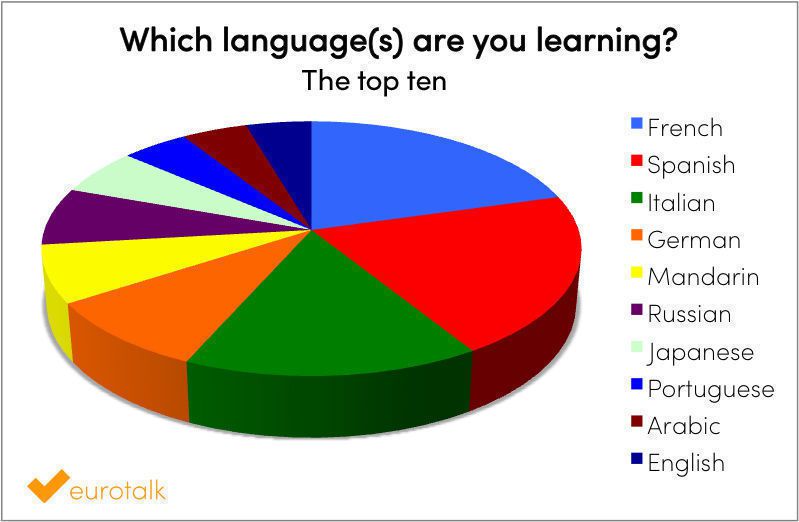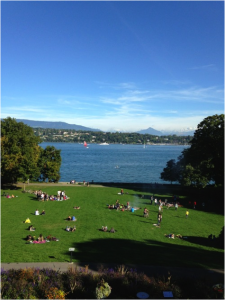Book review: Through the Language Glass
Ever wondered what us language geeks do for fun in our spare time? Reading books about languages, of course! Well, not all the time – but I recently read the very interesting Through the Language Glass by Guy Deutscher, and would recommend it to anyone else who is interested in how different languages work, and how our mother tongue affects our thoughts and behaviour.
 Through the Language Glass is all about the ongoing linguistic debate about whether our native language affects our perception and the way we think about the world around us. A large portion of the book is dedicated to a rather in-depth discussion about the differences between colour vocabulary in various languages. You might already know that Russian and Italian have two words for ‘blue’ (light and dark blue). But you might not know that the famous Greek writer Homer didn’t have any words for blue, and instead used mostly red and black to describe the scenes of the Iliad. This led to a long debate about whether people in the past lacked our modern ‘colour sense’ and saw the world in only a few shades. You’d probably have to be pretty dedicated to trying to understand the evolving debate on the development of linguistic terms for colours to plough through this rather long section, but it is rather interesting if you’ve got the patience.
Through the Language Glass is all about the ongoing linguistic debate about whether our native language affects our perception and the way we think about the world around us. A large portion of the book is dedicated to a rather in-depth discussion about the differences between colour vocabulary in various languages. You might already know that Russian and Italian have two words for ‘blue’ (light and dark blue). But you might not know that the famous Greek writer Homer didn’t have any words for blue, and instead used mostly red and black to describe the scenes of the Iliad. This led to a long debate about whether people in the past lacked our modern ‘colour sense’ and saw the world in only a few shades. You’d probably have to be pretty dedicated to trying to understand the evolving debate on the development of linguistic terms for colours to plough through this rather long section, but it is rather interesting if you’ve got the patience.
The rest of the book moves on to some interesting discussions of smaller tribal languages in Australia and elsewhere, and how their unique features either reflect the requirements of the society/location, or affect the behaviour of the speakers. For example, the Aboriginal language Guuguu Yimithirr has no words for left and right. Instead, speakers must develop an acute sense of North, South, East and West, as it’s impossible for them to say ‘the tree is on my left’ – instead they must say ‘the tree is North of me’. Experiments have shown that even if speakers of the language are driven to new locations blindfolded, they retain their incredible sense of direction and can still describe location based on the compass directions.
And how about grammatical gender? For us English speakers, referring to a table as ‘she’, as a Spanish speaker would (la mesa), or a girl as ‘it’, as a German would (das Maedchen), seems rather odd. But for most Europeans, using a blanket ‘it’ for everything doesn’t really feel right either. So what does this mean for all those speakers of languages with grammatical gender? Do they somehow see a table as girly and feminine, and a phone (el teléfono in Spanish) as macho and masculine? Well of course not… that would be silly! But there may be subtle ways in which these distinctions affect us. Think about how we can tell a story in English being vague about the gender of the person involved. Yesterday, I had dinner with my friend. Whether that friend is male or female is none of your business! But in Spanish, you’re rather forced to disclose that ‘la amiga’ was of course a girl.
We might find the idea of a ‘gender’ for inanimate objects strange and funny, but Deutscher traces this back to at least an original logical starting point. It might surprise you to know that there are many more genders in language, beyond the masculine, feminine and neutral genders you might already know. Some languages even have a ‘vegetable’ gender, which even includes things like aeroplanes. Why, you might ask? Well, it’s simple really. The ‘vegetable’ gender may have started off for only plants. This would have included wood, and anything made from wood, such as a boat, perhaps. It’s then not such a jump to having other vehicles in the same gender.
If any of this sounds intriguing and you’d like to know more, I recommend that you pick up Deutscher’s book. It’s not quite beach reading, but it’s accessibly written, not an academic tome that’s only for linguists. I can guarantee that you’ll learn something new about languages and maybe gain a different perspective on how your native language affects your perception.
Alex
Language of the Week: German
As the annual festival of Oktoberfest gets underway in Munich this week, we’ve chosen German as our latest Language of the Week.
If you’re anything like us, when you hear ‘Oktoberfest’ you probably think of beer (oh – just us?) but there’s a lot more to the event than that. Oktoberfest is actually the world’s largest funfair, and it’s a 16-day festival running from late September to early October. There is a lot of beer consumed though – 6.7 million litres at the 2013 festival! – and it’s also a great place to try traditional German food.
German is often described as a less attractive language to learn than, say, Spanish or Italian, but we’re not sure we agree. For one thing, German’s far more creative. How many other languages have a word for ‘a face badly in need of a fist’? It’s backpfeifengesicht, in case you were interested.
Here are a few fun facts about German:
– It’s an official language of five countries: Germany, Austria, Switzerland, Luxembourg and Liechtenstein, and has at least 100 million native speakers around the world.
– You might know more German than you think – ever used the word ‘angst’, ‘kindergarten’ or ‘doppelgänger’? These are just a few examples – there are plenty more.
– German is known for its very long words, which are created by sticking together other words to explain a concept. In 2013, the language lost its longest word – rindfleischetikettierungsueberwachungsaufgabenuebertragungsgesetz – which is 63 letters long and means ‘law delegating beef label monitoring’, thanks to a change in EU regulations.
However most of these long compound words don’t appear in the dictionary. The longest word that does appear is kraftfahrzeughaftpflichtversicherung (‘automobile liability insurance’) at a mere 36 letters long, although we wish donaudampfschifffahrtsgesellschaftskapitaenswitwe (widow of a Danube steamboat company captain) was in there too.
We love this video by Language Hat, which is a really fun explanation of how these long words are put together. If you don’t find yourself craving rhubarb cake or beer by the end of it, you’re doing better than us!
– ‘Gift’ may be a nice thing in English, but in German it means ‘poison’, so be careful who you give it to…
– In German, when telling the time, ‘half three’ actually means ‘half an hour before three’ (i.e. ‘half past two’) – definitely worth knowing before making any plans.
– Germany is often known as Das Land der Dichter und Denker, which means ‘the land of poets and thinkers’. Not surprising really, since this is the country that gave us Johann Wolfgang von Goethe, Thomas Mann, Albert Einstein and the Brothers Grimm. It’s also the home of the first pregnancy test, invented by German researchers Selmar Aschheim and Bernhard Zondek. So now you know.
We know there are a lot of German fans out there, so please tell us why you love the language and the country – either in the comments or on Twitter to @EuroTalk with hashtag #loveGerman 🙂
And if we’ve convinced you to give German a go, remember you can start learning it completely free with uTalk or the free demo on our website.
Are you a language geek?
We’re proud to be language geeks here at EuroTalk, but we know we’re not the only ones! Here’s your opportunity to show us what you know… Can you get 100%? And more importantly, can you beat your friends? 😉
(By the way, if you want to cheat on any of the questions, the words we’ve used in the quiz are in our uTalk app – now available in 100 languages on iPad, iPhone and iPod touch.)
Which language are you learning? The results!
We had a great response to our recent language learning survey; thank you to everyone who took the time to complete it. First things first: we’re delighted to announce that the winner of the iPad mini prize draw is Konstantia Sakellariou. Congratulations, Konstantia – your iPad is on its way!
We wanted also to share a few of our findings with you. Some of the results from the survey were as we expected, others were quite surprising. Here are just a few of the things you had to tell us. Thanks again for all your thoughtful responses, we’ll put them to good use.
Which language(s) are you learning (or would like to learn)?
The first question was pretty straightforward. A couple of people ticked every language on offer (over 100) – now that’s what we call ambition! – but most chose between 1 and 5. Here are the top ten most popular languages:  Other popular choices included Greek, Swedish, Dutch, Brazilian Portuguese, Norwegian, Irish, Polish and Icelandic. We also got some requests for languages we don’t yet offer, like Guernésiais and Twi – we’ll do our best to add those languages to our list, so watch this space!
Other popular choices included Greek, Swedish, Dutch, Brazilian Portuguese, Norwegian, Irish, Polish and Icelandic. We also got some requests for languages we don’t yet offer, like Guernésiais and Twi – we’ll do our best to add those languages to our list, so watch this space!
Why are you learning a language?
Next, we wanted to know why you’re learning a language. Nearly half of the respondents chose travel as a reason, and almost as many said they were learning a language just for fun. 36% of respondents said it was for family reasons or for a relationship, and 27% for work. The results were quite evenly split though, showing that there’s no one overwhelming reason – everyone has their own motivation.  Among the other reasons, we had a range of answers, including an interest in the culture of the language, personal challenge and wanting to follow literature, film and music in other languages. Many people are living in another country, which was their main motivation for learning the local language. And one person said that their heart asked for the knowledge, which we loved 🙂
Among the other reasons, we had a range of answers, including an interest in the culture of the language, personal challenge and wanting to follow literature, film and music in other languages. Many people are living in another country, which was their main motivation for learning the local language. And one person said that their heart asked for the knowledge, which we loved 🙂
What prevents you from learning a language?
We were also interested to know what stops people from learning a language, so we asked you to rate the following reasons out of 5. The most common barrier to learning is a lack of time, followed by not having found the right method, and then the cost involved.  Incidentally, if you’re facing any of these barriers, you may like to check out our recent posts, on finding time to learn a language and learning on a budget. And if you’re looking for resources, did you know you can try out the EuroTalk learning method for free? Either visit our website, or download our free app, uTalk for iOS, to give it a go. We believe learning a language should be fun, because our research shows we learn much better if we’re enjoying ourselves, and this in turn makes it a lot easier to overcome the obstacles that get in the way. See what you think! Other answers included not having an opportunity to use the language, a lack of motivation and difficulty finding resources for the particular language they wanted to learn (we may be able to help there – we’ve got 136 languages and counting…).
Incidentally, if you’re facing any of these barriers, you may like to check out our recent posts, on finding time to learn a language and learning on a budget. And if you’re looking for resources, did you know you can try out the EuroTalk learning method for free? Either visit our website, or download our free app, uTalk for iOS, to give it a go. We believe learning a language should be fun, because our research shows we learn much better if we’re enjoying ourselves, and this in turn makes it a lot easier to overcome the obstacles that get in the way. See what you think! Other answers included not having an opportunity to use the language, a lack of motivation and difficulty finding resources for the particular language they wanted to learn (we may be able to help there – we’ve got 136 languages and counting…).
How have you used your language when travelling?
Finally, we asked how knowing another language has been useful when you’re travelling. There was no clear winner here, which just goes to show knowing a language is always useful! But the top response was that it gives you the ability to talk to locals in their own language; many people added that they felt more welcome as a result and that it gave them independence so they could make the most of their trip. There were lots of practical reasons too, with getting around and eating out narrowly beating shopping in the poll. If you missed out on the survey this time, don’t worry – we’re planning another one soon, so keep an eye on the blog (you can subscribe by email above to get the latest updates), or follow us on Facebook or Twitter. And if you didn’t answer this survey but would still like to have your say on any of the questions, you’re very welcome to email us or add your thoughts in the comments below.
If you missed out on the survey this time, don’t worry – we’re planning another one soon, so keep an eye on the blog (you can subscribe by email above to get the latest updates), or follow us on Facebook or Twitter. And if you didn’t answer this survey but would still like to have your say on any of the questions, you’re very welcome to email us or add your thoughts in the comments below.
Liz
Data above based on 877 survey responses.
10 reasons to visit… Geneva
When I tell people that I lived in Geneva for five months during my Erasmus year, most say ‘Geneva, yeah…I’ve been to the airport,’ and I have to confess that I was once amongst them. The city as far as I was concerned was a necessary stop on the way towards my most adored pastime (snowboarding), and little else. Although not high up on most students’ list of places to spend a considerable amount of time, due to its costliness and largely conservative culture, I managed to find a host of affordable enjoyments in which you can partake, if ever stuck on a flight transfer or, you know, you actually decide to visit.
Switzerland has three official languages – French, German and Italian. The language predominantly spoken in Geneva is French – don’t forget to learn a little before you go…
1. Lac Léman (pronounced “lemon” in a French-sounding accent)
A beautiful body of water 73km long that is flanked by the Jura mountains to the North and the Alps to the South. On a clear, crisp, winter’s day you can see the snowy summit of breath-taking Mont Blanc, which I can assure you, is the best cure for any heaviness of heart. If you buy a transport pass, it includes trips from one side to the other (at the narrower, city end) – just imagine if that were your daily commute! The lake is great for running around, swimming in and looking at from a variety of locations. Parks worth a visit along the banks are: ‘Mon Repos’ and the ‘Jardin Botanique’ on the Rive Gauche, or ‘La Grange’ on the Rive Droite.
2. Buvette des Bains des Pâquis, Quai du Mont Blanc
It is here that you can combine two of the most Swiss of pastimes: the eating of fondue, by a lake. Although the summer menu doesn’t offer this cheese and wine based delight, the atmosphere of the place is still something to enjoy. If you don’t fancy eating, you can also indulge in a Hammam or massage, or depending on how brave you’re feeling, jump straight in the lake. I went in in December, which I would highly recommend!
3. The ‘brocante’ at Plaine de Plainpalais
Every Wednesday and Saturday, and every first Sunday of the month, the Plaine de Plainpalais holds one of Switzerland’s largest flea markets. From old postcards to candelabras, fur coats to vintage skis, treasures abound. Food stalls selling many different international delights of various savoury and sweet description, and you could easily spend a whole morning trawling through the crates of CDs and photographs. Bargain brocante hunting!
4. The Palais de Nations
The UN offer tours in 15 different languages, through the hallways and into the conference rooms where the world’s wrongs are put to rights. The complex is centred around President Woodrow Wilson’s ‘League of Nations’ building from the 1920s, and the view out onto the lake is in itself pretty inspiring. All in all, a worthwhile experience.
5. International Red Cross and Crescent Museum
The Red Cross was founded in Geneva in 1863 with a view to offering support and relief to wounded soldiers. Since then, the organisation has grown to protect victims of international and domestic conflict. This museum was harrowing and heart-warming at the same time, with so many first-person sources, and an impressive interactive learning facility.
6. Proximity to ski resorts
Ok, arguably this isn’t a reason to visit Geneva, but it’s definitely something that’s great about the city. There are 23 resorts within an hour’s drive, making a weekend break in the mountains a perfectly viable option. If you’re wanting to go further afield, many companies run regular bus services from the airport, which is only a ten-minute efficiently-run Swiss train ride away from the centre.
7. Cathédrale St. Pierre
Situated on the hill of the beautiful old town of Geneva, this Cathedral has a spectacular panoramic view of the city and the mountains that lie beyond. The cathedral itself is an impressive structure, and inside lies the chair of Jean Calvin, one of the pivotal figures of the 16th century Protestant Reformation.
8. CERN
Whilst living in Geneva, I was lucky enough to attend a CERN open day and it thoroughly amazed and confused me. The European Centre for Nuclear Research is a complicated network of warehouses and research buildings that give the appearance of a large village, oh, and there’s a 27km underground Large Hadron Collider too. The visit was more science than I have learnt in my whole life, squished into an afternoon, and I left frazzled but fascinated!
9. Ice Hockey
I will confess that I was already an ice hockey fan before moving to Geneva, but watching Genève Servette play really entrenched my love for the sport. The atmosphere at a game is instantly electric because not only are the fans excited, but also cold, so everyone shouts and jumps right from the get go. The team are definitely worth watching too – this last season they made it to the semi-final of the Swiss National Championships where they had to play ZSC Lions seven times, and unfortunately lost out on a finals place only in the last game.
10. Carouge
This little market town, south of the city, is full of boutiques and hosts a variety of themed markets throughout the year. There are the regular stalls selling meat, cheese, fruit and veg, but it’s worth going at Christmas time to get a sense of the community. Another favourite was when I was there in October and they had a sheep-shearing demonstration and a petting zoo, complete with a show where a sheepdog herded some geese. #Switzerweird
Have you been to Geneva? Share your own reasons to visit in the comments – and remember, we’re always open to suggestions for new places to feature!
Lucy



